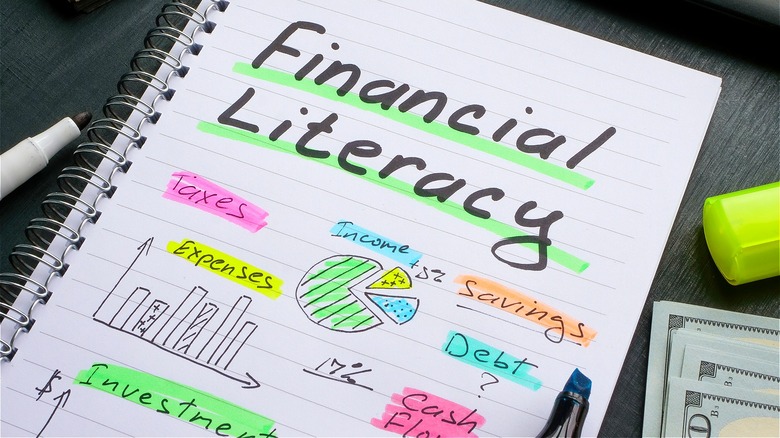Better Know Your Wallet: The Cost Of Financial Illiteracy Is Skyrocketing For One Big Reason
As an adult, it pays to understand your finances. From budgeting to retirement to understanding which small businesses have a higher failure rate, having a financially literate foundation can and will dramatically change your financial decisions. This can affect not just your present, but also how you might prepare for your future. Unfortunately, this financial literacy is not as common as you might think. According to a 2023 report from Ramsey Solutions, only 17% of U.S. adults reported taking a personal finance class in high school (and only 25 states require a personal finance class in order to graduate). This has left many Americans unprepared for handling complicated financial situations, especially in the wake of current inflation and interest rate changes.
While a lack of financial literacy was never good, certain economic factors (like low-interest rates) buffered the potential for costly financial mistakes. However, while these mistakes might have been less financially damaging pre-pandemic, mistakes in 2024's market could lead to financial ruin. This is what makes the current state of financial illiteracy so costly. In particular, the sharp change in financial requirements for would-be homeowners represents one of the most treacherous areas for those struggling with financial literacy. We spoke with Jason Tartick, bestselling author, finance expert, and podcast host about financial illiteracy. Tartick explained, "We know that we're not taught this stuff in the school system, and so the gap of not knowing things [...] related to finance right now is increasing and [is creating an] even harder and more challenging gap within financial wealth and understanding."
Financial literacy and homeownership
While inflation and the general rise in the cost of goods have definitely changed the financial landscape for Americans in many areas of their lives, perhaps nowhere is the lack of financial literacy more harmful than when considering homeownership. The current housing market has, perhaps more than anywhere else, created an environment ripe for financial missteps that could have serious long-term consequences. Jason Tartick told us, "There are studies out there saying that new first-time home buyers have to make 80% more in 2024 than first-time home buyers in 2020. That is a huge change." From down payments, to interest rates affecting monthly mortgage payments, people without a solid understanding of their financials could find themselves in over their heads.
As Tartick put it, "At 0% interest rates and when mortgages were in the 2-3% range, if we weren't aware, the price of not being aware was minimal. The price of not being aware today is massive." With the Federal Reserve keeping interest rates high, potential homebuyers face higher mortgage payments and larger overall repayment agreements. It's also worth noting that even homebuyers who were able to secure much lower interest rates in 2020 are also currently financially struggling. Since many ended up purchasing at the limit of what they could afford at the time, they now face strained financials in the wake of inflation and increased costs. That has caused the foreclosure filing rate in the United States to experience an 8% annual increase from 2023 to 2024 (however, be wary before buying a foreclosed home).
How to improve your financial literacy
If you're one of the 36% of Americans who are not considered financially literate, there are many ways to grow your knowledge base. It's also important to mention that, according to an Ipsos poll, conducted on behalf of Money Matters, one in four people surveyed who self-reported themselves as financially literate did not pass a financial quiz. This means that even if you believe you have a better-than-average understanding of financial principles, there's always room for improvement. As Warren Buffett once put it, "The more you learn, the more you'll earn."
While it might be easy to think that investing is the core of financial literacy, it's merely one small component of understanding financial concepts. According to Finance Strategists, there are several key components of financial literacy. The first, and an excellent entry point for anyone wanting to grow their knowledge, is budgeting and expense management (you can start by learning what a budget is). Other components include saving and investing, debt management, retirement planning, insurance and risk management, and understanding financial products. If any of these categories seem like an area you're less familiar with, then dive right in!
Between online resources, classes, a wide selection of available books, and even videos and podcasts, there's no end to the ways you can learn more about financial topics. The hardest part can be realizing (or even admitting) where your knowledge might be lacking. However, the best way to educate yourself is to start by recognizing what you don't know.


